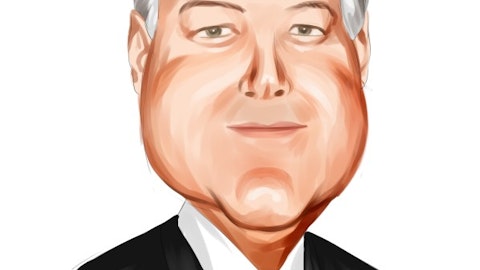Horacio Rozanski: I had the pleasure of spending time with our team in Europe late last year and just be inspired and amazed by the work that they’re doing in support of our government as our government supports Ukraine. And so we’re well deployed in the middle of that mission, helping drive intelligence, helping drive analysis and doing really good work. So overall, that – sort of that’s our posture. It’s a posture that is longstanding. It’s a longstanding team that has pivoted to this mission. There’s obviously been some growth on the team as a result of additional mission needs. I would expect that to continue. But I don’t see that as a meaningful driver of growth as much as I see it as a real demonstration of the great work that we got on people can do as we bring technology to the mission needs.
Eric Allen: Okay, got it. Thank you.
Horacio Rozanski: Thank you.
Operator: One moment. And our next question will come from Tobey Sommer of Truist. Your line is open.
Tobey Sommer: Thanks. I wanted to ask a question about the debt ceiling negotiation. As these proceeds, but do you have see any risk to the spending patterns in the current fiscal year as procurement officers’ kind of watch this being bantered about in the news? And are there any analog experiences in history that you would reference as sort of being benchmarks or examples of how impacts either emerge or don’t?
Horacio Rozanski: It’s really hard to predict that what will happen sort of second and third order effects of the debt ceiling debate. It’s even hard to understand what the first order effects will be. I will say this. I mean, obviously, a protracted fight on that in our view is not good for the country, and it’s certainly not good for our clients and by extension is not great for us. I think part of our approach to all of this is – and this is why – is to build momentum to drive the business that’s in front of us, to grow organically, to have the right people doing the right work at the center of these missions, which tends to be more resilient to overall sort of external uncertainty. That’s what we have done in the past. That’s what we are doing now.
And that’s what gives us confidence that despite the fact that there’s that issue, there’s next year’s government budget and all of that, which are things that we are watching very closely. Ultimately, we are on track and remain on track to deliver our investment thesis to advance VoLT and to be the kind of partner to our clients that they need us to be right now.
Matt Calderone: And the industry has a lot of experience, unfortunately, with budgetary uncertainty. We have it. Others in the industry have it. And as Horacio said, we’ve told the team is play the game in front of us. And the best thing we can do is to prepare for uncertainty is to build as strong a business as possible. And we feel like we’re well positioned strategically through Volt, as Horacio mentioned, and our client positioning operationally. We’re running the business very, very well. I think more disciplined than we’ve ever run it. And financially, given the strength of our performance and the quality of our balance sheet. And we sort of glossed over it because there’s a lot of news in the quarter, but I think us being upgraded to investment grade is a reflection of that.
Tobey Sommer: Absolutely. As you look at your principal government customer sets in civil, defense and Intel, how would you stratify the growth prospects for calendar ’23? And does it sort of purely map against headline budget outlays and growth this year? Or is there a nuance or difference among them?





